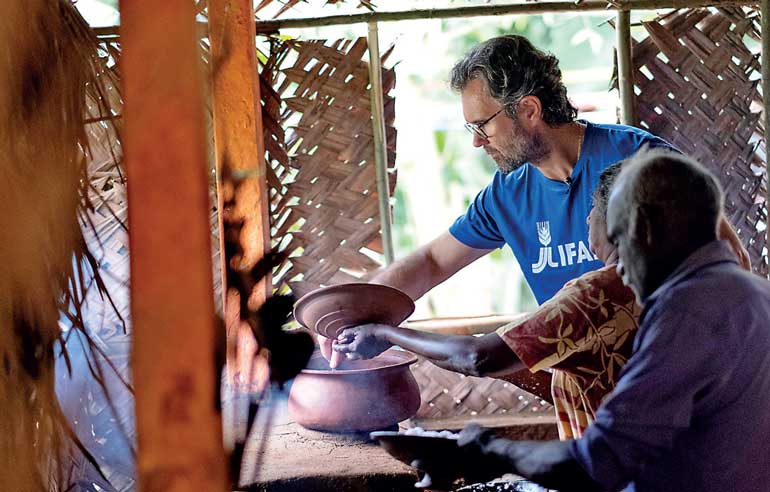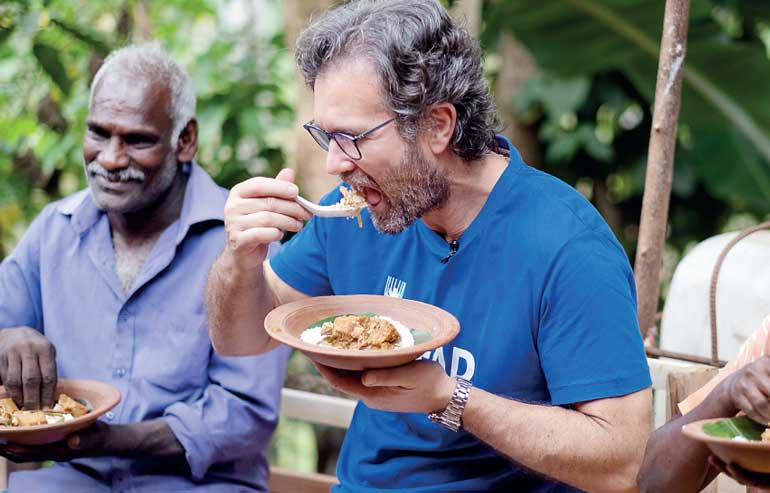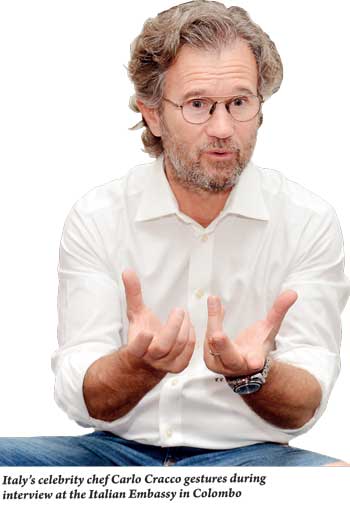Thursday Feb 19, 2026
Thursday Feb 19, 2026
Saturday, 26 March 2022 00:13 - - {{hitsCtrl.values.hits}}

Italy’s celebrity chef Carlo Cracco cooks polos in Matale
Italy’s celebrity chef Carlo Cracco savours polos with a farmer family in Matale
 One of Italy’s best-known chefs, Carlo Cracco, will be promoting Sri Lanka’s famous dishes made from polos (jackfruit) as well as his own menus made with it following an initiative championed by UN’s rural development agency International Fund for Agricultural Development (IFAD).
One of Italy’s best-known chefs, Carlo Cracco, will be promoting Sri Lanka’s famous dishes made from polos (jackfruit) as well as his own menus made with it following an initiative championed by UN’s rural development agency International Fund for Agricultural Development (IFAD).
For this exercise Carlo stayed with a family in Matale engaged in the IFAD-supported Smallholder Agribusiness Partnerships Program. He experienced how kiri kos and polos curry are made and savoured dried vala and waraka as well as pol sambol.
Carlo’s visit was under the IFAD’s ‘Recipes for Change’ campaign, where world-famous chefs visit project locations and cook and eat local recipes with project participants, often using ingredients that are under threat from climate change.
Carlo told the Daily FT that polos was a great discovery for him and he enjoyed it. He said he was excited to promote dishes made from polos once back in Italy. He also said that polos is a great substitute of meat for people who have become vegans or want to. This facet of polos is promoted and can reduce use of meat thereby making its own contribution to address climate change.
Sri Lanka’s Sinhala word ‘polos’ interestingly is similar to ‘pollo’ in Italian which means chicken. The chef in fact confirms that “Sri Lanka’s polos can be described as vegan meat or a vegan substitute for meat,” said Carlo during a reception hosted by Italian Ambassador Rita Mannella.
“For us, it is important to discover these authentic flavours that are so powerful and rich,” said Carlo, who comes from Vicenza, Italy. He is at the forefront of the new generation of progressive Italian cuisine.
Having honed his culinary skills in some of the best restaurants in Milan, Paris and Monte Carlo, he now plies his trade in the renowned Milanese eateries Cracco and Carlo e Camilla in Segheria, with the former regularly featuring in world’s best restaurant lists. In addition to his culinary exploits, Cracco has also carved out a successful media career, featuring prominently in the Italian versions of popular cooking programs Hell’s Kitchen and Masterchef.
Since 2012, Cracco has also served as president of Mestro Martino, a non-profit organisation dedicated to promoting the Lombardi agri-food supply chains.
IFAD’s Recipes for Change campaign covers 19 global celebrity chefs. Under the program Carlo had previously visited Bhutan, Cambodia and Morocco. In Cambodia he discovered ‘samlor kako’, a popular Cambodian curry dish. In Morocco it was ‘Lamb tagine with Moroccan truffles’ and in Bhutan it was Ema Datshi and Millet Momos.
IFAD primarily works for small-scale farmers, to support sustainable livelihoods for them, through various means, and to ensure that they become resilient to climate and other shocks. IFAD has found the Recipes for Change campaign as one of the effective ways to spread the message.
Recipes for Change is a series of recipes from developing countries that bring you a taste of someone else’s life. It gives you the chance to cook the same meals as the Hong family in the Mekong Delta or Olive Bibutsuwahoze and her family in eastern Rwanda.
These recipes also examine the threats that climate change brings to rural communities, many of which affect the essential ingredients used in these families’ main meal of the day. They show how IFAD is working with farmers to adapt to the very real impacts of climate change in their communities.
According to IFAD, one in three people are dependent on smallholder farms for their food security. Smallholder farmers are often located on marginal lands where the impacts of climate change are more strongly felt, often reducing crop yields and incomes. Small-scale farmers must adapt to the impacts of climate change without delay. Adaptation to climate change can increase smallholders’ food security and income, IFAD stressed.